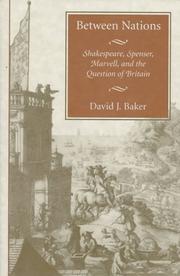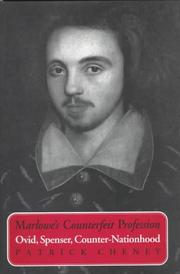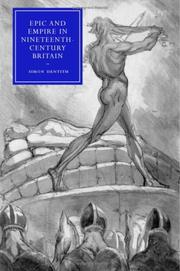Book
Year: 2006 Publisher: Columbus : Ohio State University Press,
Abstract | Keywords | Export | Availability | Bookmark
 Loading...
Loading...Choose an application
- Reference Manager
- EndNote
- RefWorks (Direct export to RefWorks)

ISBN: 0804729972 Year: 1997 Publisher: Stanford, Calif. Stanford University Press
Abstract | Keywords | Export | Availability | Bookmark
 Loading...
Loading...Choose an application
- Reference Manager
- EndNote
- RefWorks (Direct export to RefWorks)
Book
Year: 2006 Publisher: Columbus : Ohio State University Press,
Abstract | Keywords | Export | Availability | Bookmark
 Loading...
Loading...Choose an application
- Reference Manager
- EndNote
- RefWorks (Direct export to RefWorks)
Book
ISBN: 9780691135168 Year: 2008 Publisher: Princeton Princeton university press
Abstract | Keywords | Export | Availability | Bookmark
 Loading...
Loading...Choose an application
- Reference Manager
- EndNote
- RefWorks (Direct export to RefWorks)
Book
ISBN: 1317143019 1282295225 9786612295225 0754696952 9780754696957 0754656721 9780754656722 9781282295223 9780754656722 9781317143017 6612295228 9781315579771 9781317143000 9781138259454 1317143027 1315579774 1138259454 Year: 2009 Publisher: Farnham, England Burlington, VT Ashgate
Abstract | Keywords | Export | Availability | Bookmark
 Loading...
Loading...Choose an application
- Reference Manager
- EndNote
- RefWorks (Direct export to RefWorks)
This is the first systematic analysis of the relationship between representations of 'Germanness' in modernist British literature, the construction of English identity and the negotiation of modernity. Major figures such as Conrad, Woolf and Ford are examined alongside popular or less-familiar writers such as Saki and Stevie Smith. Rau's book will be invaluable to scholars and will serve undergraduates working in modernism, literary history, and European cultural relations.
Book
ISBN: 1282157825 9786612157820 1400828937 9781400828937 9781282157828 9780691146621 0691146624 9780691135168 0691135169 Year: 2008 Publisher: Princeton, NJ
Abstract | Keywords | Export | Availability | Bookmark
 Loading...
Loading...Choose an application
- Reference Manager
- EndNote
- RefWorks (Direct export to RefWorks)
What fueled the Victorian passion for hair-jewelry and memorial rings? When would an everyday object metamorphose from commodity to precious relic? In Portable Property, John Plotz examines the new role played by portable objects in persuading Victorian Britons that they could travel abroad with religious sentiments, family ties, and national identity intact. In an empire defined as much by the circulation of capital as by force of arms, the challenge of preserving Englishness while living overseas became a central Victorian preoccupation, creating a pressing need for objects that could readily travel abroad as personifications of Britishness. At the same time a radically new relationship between cash value and sentimental associations arose in certain resonant mementoes--in teacups, rings, sprigs of heather, and handkerchiefs, but most of all in books. Portable Property examines how culture-bearing objects came to stand for distant people and places, creating or preserving a sense of self and community despite geographic dislocation. Victorian novels--because they themselves came to be understood as the quintessential portable property--tell the story of this change most clearly. Plotz analyzes a wide range of works, paying particular attention to George Eliot's Daniel Deronda, Anthony Trollope's Eustace Diamonds, and R. D. Blackmore's Lorna Doone. He also discusses Thomas Hardy and William Morris's vehement attack on the very notion of cultural portability. The result is a richer understanding of the role of objects in British culture at home and abroad during the Age of Empire.

ISBN: 1282009451 9786612009457 1442677066 9781442677067 0802009719 9780802009715 1442612967 Year: 1997 Publisher: Toronto
Abstract | Keywords | Export | Availability | Bookmark
 Loading...
Loading...Choose an application
- Reference Manager
- EndNote
- RefWorks (Direct export to RefWorks)
Cheney argues that Marlowe organizes his canon around an ""Ovidian"" career model, or cursus, which turns from amatory poetry to tragedy to epic. The first comprehensive reading of the Marlowe canon in over a generation.
Authorship --- English literature --- National characteristics, British, in literature. --- LITERARY CRITICISM / Drama. --- Authoring (Authorship) --- Writing (Authorship) --- Literature --- History --- Roman influences. --- History and criticism --- Theory, etc. --- Marlowe, Christopher,
Book
ISBN: 9780874130430 0874130433 Year: 2009 Publisher: Newark University of Delaware press
Abstract | Keywords | Export | Availability | Bookmark
 Loading...
Loading...Choose an application
- Reference Manager
- EndNote
- RefWorks (Direct export to RefWorks)
English literature --- Heroic virtue in literature. --- Literature and society --- National characteristics, British, in literature. --- Politics and literature --- History and criticism. --- History --- Great Britain --- Intellectual life --- Heroic virtue in literature --- National characteristics, British, in literature --- British literature --- Inklings (Group of writers) --- Nonsense Club (Group of writers) --- Order of the Fancy (Group of writers) --- History and criticism

ISBN: 0521862655 9780521862653 9780511484773 9780521123570 9780511226410 0511226411 0511224559 9780511224553 0511225229 9780511225222 0511225849 9780511225840 0511484771 1280541458 9781280541452 0511317255 9780511317255 0521123577 110716866X Year: 2006 Publisher: Cambridge Cambridge university press
Abstract | Keywords | Export | Availability | Bookmark
 Loading...
Loading...Choose an application
- Reference Manager
- EndNote
- RefWorks (Direct export to RefWorks)
In the nineteenth century, epic poetry in the Homeric style was widely seen as an ancient and anachronistic genre, yet Victorian authors worked to recreate it for the modern world. Simon Dentith explores the relationship between epic and the evolution of Britain's national identity in the nineteenth century up to the apparent demise of all notions of heroic warfare in the catastrophe of the First World War. Paradoxically, writers found equivalents of the societies which produced Homeric or Northern epics not in Europe, but on the margins of empire and among its subject peoples. Dentith considers the implications of the status of epic for a range of nineteenth-century writers, including Walter Scott, Matthew Arnold, Elizabeth Barrett Browning, William Morris and Rudyard Kipling. He also considers the relationship between epic poetry and the novel and discusses late nineteenth-century adventure novels, concluding with a brief survey of epic in the twentieth century.
English literature --- Epic literature --- Literature and history --- National characteristics, British, in literature --- 820 "18" --- 82:93 --- 82:93 Literatuur en geschiedenis --- Literatuur en geschiedenis --- 820 "18" Engelse literatuur--19e eeuw. Periode 1800-1899 --- Engelse literatuur--19e eeuw. Periode 1800-1899 --- History and criticism --- National characteristics, British, in literature. --- History and criticism. --- Arts and Humanities --- Literature
Book
ISBN: 9780521190947 9780511750793 9781107449145 0521190940 9780511750052 0511750056 051175079X 0511850220 1107204003 1282630784 9786612630781 0511749309 0511743505 0511742436 0511744595 1107449146 Year: 2010 Volume: 86 Publisher: Cambridge New York Cambridge University Press
Abstract | Keywords | Export | Availability | Bookmark
 Loading...
Loading...Choose an application
- Reference Manager
- EndNote
- RefWorks (Direct export to RefWorks)
What did it mean to be British, and more specifically to feel British, in the century following the parliamentary union of Scotland and England? Juliet Shields departs from recent accounts of the Romantic emergence of nationalism by recovering the terms in which eighteenth- and early nineteenth-century writers understood nationhood. She argues that in the wake of the turmoil surrounding the Union, Scottish writers appealed to sentiment, or refined feeling, to imagine the nation as a community. They sought to transform a Great Britain united by political and economic interests into one united by shared sympathies, even while they used the gendered and racial connotations of sentiment to differentiate sharply between Scottish, English, and British identities. By moving Scotland from the margins to the center of literary history, the book explores how sentiment shaped both the development of British identity and the literature within which writers responded creatively to the idea of nationhood.
English literature --- Scottish literature --- National characteristics, British, in literature. --- National characteristics, Scottish, in literature. --- Nationalism and literature --- Sympathy in literature. --- Scottish authors --- History and criticism. --- History --- Literature and nationalism --- Literature --- Scots literature --- British literature --- Arts and Humanities

 Search
Search Feedback
Feedback About UniCat
About UniCat  Help
Help News
News